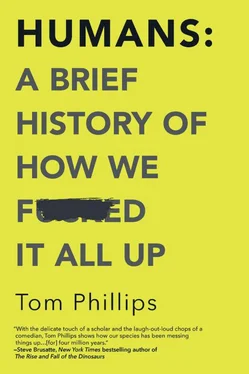Tom Phillips - Humans - A Brief History of How We F*cked It All Up
Здесь есть возможность читать онлайн «Tom Phillips - Humans - A Brief History of How We F*cked It All Up» весь текст электронной книги совершенно бесплатно (целиком полную версию без сокращений). В некоторых случаях можно слушать аудио, скачать через торрент в формате fb2 и присутствует краткое содержание. Город: Toronto, Год выпуска: 2019, ISBN: 2019, Издательство: Hanover Square Press, Жанр: История, Юмористические книги, на английском языке. Описание произведения, (предисловие) а так же отзывы посетителей доступны на портале библиотеки ЛибКат.
- Название:Humans: A Brief History of How We F*cked It All Up
- Автор:
- Издательство:Hanover Square Press
- Жанр:
- Год:2019
- Город:Toronto
- ISBN:978-1-48805-113-5
- Рейтинг книги:4 / 5. Голосов: 1
-
Избранное:Добавить в избранное
- Отзывы:
-
Ваша оценка:
- 80
- 1
- 2
- 3
- 4
- 5
Humans: A Brief History of How We F*cked It All Up: краткое содержание, описание и аннотация
Предлагаем к чтению аннотацию, описание, краткое содержание или предисловие (зависит от того, что написал сам автор книги «Humans: A Brief History of How We F*cked It All Up»). Если вы не нашли необходимую информацию о книге — напишите в комментариях, мы постараемся отыскать её.
Humans: A Brief History of How We F*cked It All Up — читать онлайн бесплатно полную книгу (весь текст) целиком
Ниже представлен текст книги, разбитый по страницам. Система сохранения места последней прочитанной страницы, позволяет с удобством читать онлайн бесплатно книгу «Humans: A Brief History of How We F*cked It All Up», без необходимости каждый раз заново искать на чём Вы остановились. Поставьте закладку, и сможете в любой момент перейти на страницу, на которой закончили чтение.
Интервал:
Закладка:
We can’t. Not really, despite the amazing work done by historians and archaeologists and experts in a dozen other fields. The number of things that we know for certain is pretty tiny compared to the number of things that we know we don’t know. The number of things that we don’t even know we don’t know is probably far bigger still, but unfortunately we don’t know for sure.
What I’m saying is: the chance of this book about fuck-ups not including any fuck-ups in it is, frankly, minimal. I’ll try to make it clear where there’s uncertainty: which are the bits we’re pretty sure about, and which are the bits where the best we can do is an educated guess. I’ve tried to avoid any “too good to be true” stories, the apocryphal tales and pithy historical anecdotes that seem to grow with each retelling. I hope I don’t get it wrong.
Which brings us back to Lucy, falling out of her tree 3.2 million years ago. How do we know she fell out of that tree? Well, in 2016, a group of researchers from the USA and Ethiopia published a paper in Nature , the world’s leading scientific journal. They CT-scanned Lucy’s fossilized bones, creating 3-D computer maps of them to reconstruct her skeleton. They found that the fractures in her bones were the kind that happen to living bones, and that these fractures never healed: suggesting that she was alive when they broke but died soon after. They consulted numerous orthopedic surgeons, who all said the same thing: this is the pattern of broken bones that you see in a patient who has fallen from a height. The way her arm is fractured suggests that she reached out to try to break her fall. From geological studies, they knew the area she lived in was flat woodland, near a stream: no cliffs or outcrops for her to fall off. The conclusion? Lucy fell out of a tree.
It’s a remarkable piece of work, and one that was well received by many other experts in the field. The only problem is that a few other experts—including Donald Johanson, the man who discovered Lucy in the first place—weren’t convinced. They effectively said: “Nah, mate, the reason her bones are broken is because that’s what happens to bones when they’re buried in the ground for 3.2 million years.” (I’m paraphrasing a bit here.)
So… did Lucy fall out of a tree? Maybe. Probably, even. In many ways, that’s the point of this book: we have this incredible feat of scientific deduction, and it still might be wrong. You can be a world leader in your field, doing the best work of your career, a groundbreaking study published in the world’s most prestigious journal that weaves together jaw-dropping advances in the fields of paleontology and physics, computing and medicine, forensics and geology, to give us an unprecedented window into a time millions of years ago… and you still run the risk that someone will come along and go: “Hahahaha, nope.”
Just when you think you’ve got it all sorted out, that’s when the ever-looming specter of fuck-ups will strike.
Remember Sigurd the Mighty.
1
Why Your Brain Is an Idiot
It was about 70,000 years ago that human beings first started to really ruin things for everybody.
That’s when our ancestors began to migrate out of Africa and spread across the globe—first into Asia, and a while later into Europe. The reason this made a lot of people rather unhappy is that back then our species, Homo sapiens , weren’t the only humans on the planet—far from it. Exactly how many other species of humans were knocking around at that point is a matter of some debate. The business of taking fragmentary skeletons or fragmentary DNA and trying to work out exactly what counts as a separate species, or subspecies, or just a slightly weird version of the same species, is a tricky one. (It’s also an ideal way to start an argument should you ever find yourself among a group of paleoanthropologists with some time to kill.) But however you classify them, there were at least a couple of other types of humans on the planet back then, of which the most famous is Homo neanderthalensis —or, as they’re better known, the Neanderthals. The result of previous human migrations from Africa, they’d been living across much of Europe and large parts of Asia for over 100,000 years. They basically had quite a good thing going.
Unfortunately for them, just a few tens of thousands of years after our ancestors rocked up on the scene—the blink of an eye in evolutionary terms—the Neanderthals and all our other relatives were gone from the face of the earth. In a pattern that would quickly establish itself throughout human history, as soon as we arrive, there goes the neighborhood. Within a few thousand years of modern humans moving into an area, the Neanderthals start to vanish from the fossil record, leaving behind only a few ghostly genes that still haunt our DNA. (There was clearly a bit of interbreeding between the Neanderthals and the interlopers who were replacing them; if you’re of European or Asian descent, for example, there’s a good chance that somewhere between 1 and 4 percent of your DNA is Neanderthal in origin.)
Exactly why and how we survived while our cousins got the fast train to Extinctionville is another subject of debate. In fact, lots of the most likely explanations are themes that will keep cropping up again and again in this book. We might have accidentally wiped out the Neanderthals by bringing diseases with us as we migrated that they didn’t have any resistance to. (A large part of the history of humanity is really just the history of the diseases we manage to pick up on our travels and then give to each other.) We might have got lucky with a fluctuating climate that we were better able to adapt to; the evidence suggests our ancestors lived in bigger social groups, and communicated and traded over a much larger area than the more isolated, stick-in-the-mud Neanderthals, meaning they could draw on more resources when a cold spell hit.
Or maybe we just murdered them, because, hey, that’s what we do.
In all likelihood there probably isn’t a single neat explanation, because that’s not how things normally work. But many of the most plausible explanations have one thing in common—our brains, and how we use them. It’s not quite as simple as the idea that “we were smart and they were dumb”; Neanderthals weren’t the lumbering numbskulls of popular stereotype. They had brains as big as we do, and were making tools, controlling fire and producing abstract art and jewelry in Europe tens of thousands of years before Homo sapiens ever came along and started gentrifying everything. But most of the plausible advantages we had over our Neanderthal cousins relate to our thinking, whether that’s in our adaptability, our more advanced tools, our more complex social structures or the ways we communicated within and between groups.
There’s something about the way we humans think that marks us out as special. I mean, obviously. It’s right there in the name of our species: Homo sapiens is Latin for “wise man.” (Modesty, let’s be honest, has never really been one of our species’ defining traits.)
And in fairness to our egos, the human brain is a truly remarkable machine. We can spot patterns in our environment and make educated guesses from those about the way things work, building up a complex mental model of the world that includes more than what we can see with our eyes. Then we can build upon that mental model to make imaginative leaps: we’re able to envisage the changes to the world that would improve our situation. We can communicate these ideas to our fellow humans, so that others can make improvements to them that we wouldn’t have thought of, turning knowledge and invention into a communal effort that gets passed down the generations. After that, we can convince others to work collectively in the service of a plan that previously existed only in our imagination, in order to achieve breakthroughs that none of us could have made alone. And then we repeat this many times in a hundred thousand different ways, over and over again, and what were once wild innovations turn into traditions, which spawn new innovations in turn, until eventually you end up with something that you’d call “culture” or “society.”
Читать дальшеИнтервал:
Закладка:
Похожие книги на «Humans: A Brief History of How We F*cked It All Up»
Представляем Вашему вниманию похожие книги на «Humans: A Brief History of How We F*cked It All Up» списком для выбора. Мы отобрали схожую по названию и смыслу литературу в надежде предоставить читателям больше вариантов отыскать новые, интересные, ещё непрочитанные произведения.
Обсуждение, отзывы о книге «Humans: A Brief History of How We F*cked It All Up» и просто собственные мнения читателей. Оставьте ваши комментарии, напишите, что Вы думаете о произведении, его смысле или главных героях. Укажите что конкретно понравилось, а что нет, и почему Вы так считаете.












